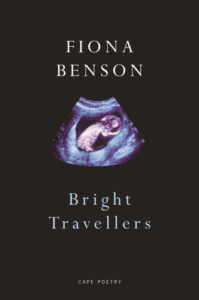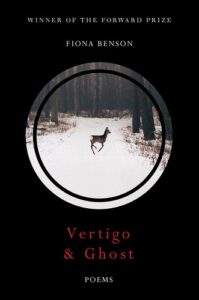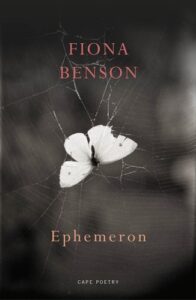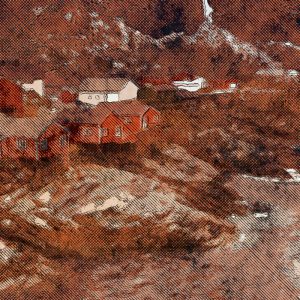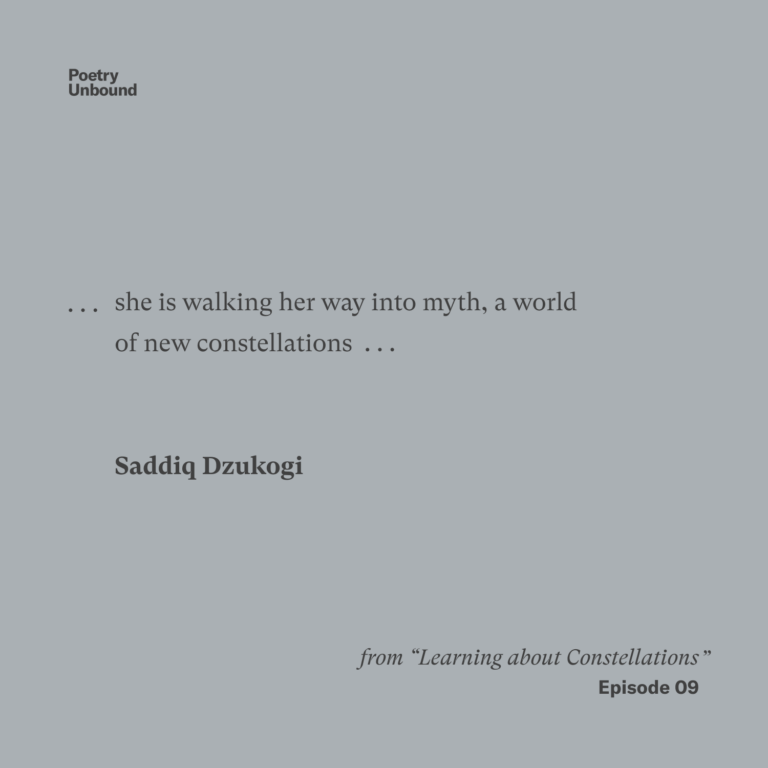Fiona Benson
Mama Cockroach, I Love You
Do you experience disgust at the sight of certain insects? Which ones? Fiona Benson teaches us how to see.
In 2019, Fiona collaborated with sound artists Mair Bosworth and Eliza Lomas for an 18-month, singing exploration of the wonders of the insect world as part of the University of Exeter’s Urgency Arts Commissions. The series of workshops culminated in a public anthology of poetry sound pieces called “In the Company of Insects.”
We’re pleased to offer Fiona Benson’s poem, and invite you to connect with Poetry Unbound throughout this season.
Pre-order the forthcoming book Poetry Unbound: 50 Poems to Open Your World and join us in our new conversational space on Substack.
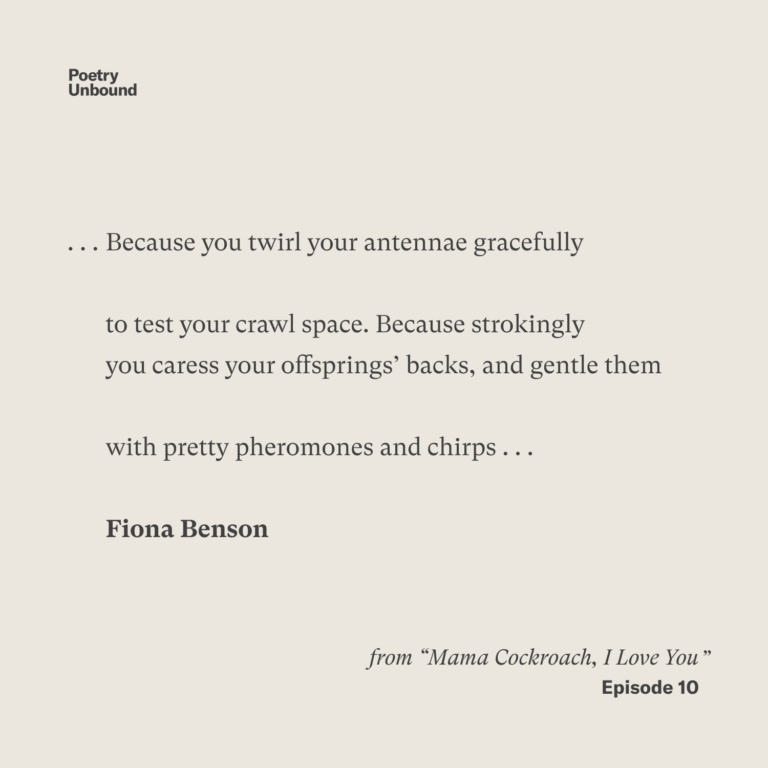
Guest

Fiona Benson is the author of several poetry collections including Bright Travellers (Jonathan Cape 2014), Vertigo & Ghost (Jonathan Cape 2019), and Ephemeron (Jonathan Cape 2022). She is the winner of the 2015 Geoffrey Faber Memorial Prize for Bright Travellers and the Forward Prize for Vertigo & Ghost. Image by: Gareth Franklin
Transcript
Pádraig Ó Tuama: My name is Pádraig Ó Tuama and this morning I ushered a mouse out of my kitchen. I’m staying in a place that is right next to a farmer’s field, and so it’s inevitable that there’s going to be mice. I see them regularly outside stealing the seeds that I leave out for birds. You see one of the mice coming out and taking some seeds and bringing them back under a hedge, presumably to feed her young. And when I saw the mouse inside the house, I didn’t want to kill it. And a friend is visiting and we ushered, with kind of squealing, the mouse outside and then gave ourselves an idiotic self congratulating clap.
I definitely do not want mice in the house, but I definitely also have changed, because I’ve seen them feeding themselves, feeding their offspring. And seeing them in that environment has changed the way I feel about them when we have to share an environment.
[music: “Praise the Rain” by Gautam Srikishan]
“Mama Cockroach, I Love You” by Fiona Benson:
Blattodea
“Because you cosy with the aunties in your
reeking slums, and are intimate and sweet.
“Because you begrudge no one a meal, but ooze
a faecal trail to lead your commune to its source,
“like a dirty bee. Because you are joyfully promiscuous.
Because you pouch your young and hide them
“in the sweaty creases of the house
near suppurating food so they’ll hatch to a feast;
“or, keep your eggs with you in a special purse
shaped like a kidney bean, and clutch it fast;
“or reinsert them into your abdomen
and womb them there; or carry them as yolks
“and give live birth, then feed your pale brood
secretions from your anus, or your armpit glands,
“like milk; or, deep in the flesh of a rotten log
pass them a bolus of pre-digested food, mouth to mouth.
“Because you suffer your young to swarm upon
your back, and do not flinch or buck them off,
“but carry them like a human playing horsey
with her children, down on hands and knees,
“decrying the swag of her own loose flesh.
Because you twirl your antennae gracefully
“to test your crawl space. Because strokingly
you caress your offsprings’ backs, and gentle them
“with pretty pheromones and chirps. Because
you purr when your young stroke your face.
“Because you would leave your body for your offspring
to dine upon — all the liquors and gravy
“of the obscene world, your work in the crannies
delivered to the living. Because you are,
“despite all rumours, mortal. And what if
you are crushed before your eggs can be delivered?
“What if your sisters drive you, hissing, out?
What if your kitchen is fumigated?!
“What if the mongoose the lizard the snake —
a muscular tongue prying at the warm and greasy interstices
“of your stubborn occupancy — takes you in its mouth?
Someone must care for the dirt.”
[music: “Taoudella” by Blue Dot Sessions]
This poem, by Fiona Benson, is one of a number of poems about, or to, insects that she has gathered as the first section of her latest book. And I love it. “Mama Cockroach, I Love You.” There’s such exuberance in it. There are over 4,000 different types of cockroach, and they’re under the term blattodea, which is mentioned as the first word of the poem. I’m not the biggest fan of cockroaches, but I came to this with a deep interest to know what’s she going to say?
Broadly, the poem is a collection of ten reasons. Because, because, because, because, because – there’s ten magnificent becauses in the poem. I see that as a way that the poem is held together. And one of them is about the cockroach and community, another is generosity. One is about being “joyfully promiscuous.” One is about parenting. Another about playing with your children. One is about loving being loved back. Another is about self-sacrificing love, and the final one is about mortality.
There is such overt emotion in it. There’s a deep naming of something: “I love you.” But even before that: “Mama Cockroach.” I’ve never in my life seen “mama” before “cockroach.” This is, I think, one of the functions of poetry, is to do interesting things with language that make you think, I haven’t seen this arrangement before, and therefore, from that to allow your world to be recalibrated, to be defamiliarized and refamiliarized into a new way of thinking.
[music: “Great Is the Contessa” by Blue Dot Sessions]
There’s so much about the life of the cockroach that’s explored here: The social and caring life of the cockroach, “cosy with your aunties” in the first line, then “intimate and sweet,” and “joyfully promiscuous,” playful with your young. I love the line, “… carry them like a human and playing horsey / with her children,” and then caressing the offsprings’ back and purring when your young stroke your face. In all of this there’s deep tenderness.
And one of the themes that’s happening underneath that is where the poem culminates, which is the death – whether that’s by fumigation, or by a mongoose or a lizard or a snake, that muscular tongue. Or they’re driven out of the kitchen. “What if your kitchen is fumigated?!” And I don’t think that this “your” is the listener. It’s the kitchen of the cockroach, whether that’s just a kitchen or the kitchen they’ve created in the corner of a shack, in the corner of a house, in the corner of anywhere.
I understand that cockroaches and their infestation can be a problem, but Fiona Benson completely undoes this word “infestation” by using all these other verbs, all these other descriptions for it. One of the things she’s doing here is to populate the language about cockroaches with so many other descriptions and nouns and verbs that can allow us to suddenly look at the cockroach, to notice. Rather than just noticing my fear or dislike or my threat or my sense of disgust, because disgust is so often part of what is happening in a human’s relationship with cockroaches. And what she does is to deepen this into the level of saying, “look, notice, learn, observe, look at all this other language that can make us think about who it is that the cockroach is, about how they are, what their society is.”
The final line, “Someone must care for the dirt.” It feels like it’s a dedication toward one of the things that a cockroach can do. The cockroach feeding releases nitrogen, which then gets into the soil and then nurtures plants. So you see cockroaches, in this final line, being justified for their place in the way of things in the world and the nurture of things. But that’s just the final line. And it’s only six words. The rest of it is saying: look at the life that the cockroach has, look at the caring, look at the mothering that’s happening here and find a way to read your life and the cockroach’s life with these other verbs rather than just “infestation.”
[music: “Dust of Summer” by Gautam Srikishan]
Fiona Benson uses a lot of language that is uncomfortable “…ooze / a faecal trail…” and “near suppurating food…” Suppurating food, rotting food, or food that’s going rancid. Then later on, “…then feed your pale brood / secretions from your anus, or your armpit glands, // like milk…”
The combination of language that is unusual or perhaps discomforting or disgusting to some. The combination of that with something like “milk” at the end of it is bringing us to the edge of questioning the experience of disgust, questioning the experience of not liking them and asking: “What are you seeing? What is happening?” Paying attention to the person who is experiencing disgust, if that is your experience, as well as then the observing of this living being that she’s praising in and of its own right.
And then the final dedication of generosity, “Because you would leave your body for your offspring / to dine upon — all the liquors and gravy // of the obscene world…” Another word that is a complicated one: “obscene” and “liquors” and “gravy.” I don’t like thinking of anybody’s body or of any body of an insect being liquor and gravy. But what is obscene? I don’t think this poem is arguing for the cockroach’s behaviors being obscene in the least bit. Perhaps human behavior, human disgust, or the ways that we act towards each other that don’t correspond to this kind of self-sacrificing love, perhaps that’s obscene.
There’s such research and insight that’s gone into this poem, and it stands as a challenge to ask again, not to say, make your home a haven for them, but it does stand as a challenge to the edge of human projection of disgust or obscenity.
[music: “The Trestle” by Blue Dot Sessions]
“Mama Cockroach, I Love You” by Fiona Benson:
Blattodea
“Because you cosy with the aunties in your
reeking slums, and are intimate and sweet.
“Because you begrudge no one a meal, but ooze
a faecal trail to lead your commune to its source,
“like a dirty bee. Because you are joyfully promiscuous.
Because you pouch your young and hide them
“in the sweaty creases of the house
near suppurating food so they’ll hatch to a feast;
“or, keep your eggs with you in a special purse
shaped like a kidney bean, and clutch it fast;
“or reinsert them into your abdomen
and womb them there; or carry them as yolks
“and give live birth, then feed your pale brood
secretions from your anus, or your armpit glands,
“like milk; or, deep in the flesh of a rotten log
pass them a bolus of pre-digested food, mouth to mouth.
“Because you suffer your young to swarm upon
your back, and do not flinch or buck them off,
“but carry them like a human playing horsey
with her children, down on hands and knees,
“decrying the swag of her own loose flesh.
Because you twirl your antennae gracefully
“to test your crawl space. Because strokingly
you caress your offsprings’ backs, and gentle them
“with pretty pheromones and chirps. Because
you purr when your young stroke your face.
“Because you would leave your body for your offspring
to dine upon — all the liquors and gravy
“of the obscene world, your work in the crannies
delivered to the living. Because you are,
“despite all rumours, mortal. And what if
you are crushed before your eggs can be delivered?
“What if your sisters drive you, hissing, out?
What if your kitchen is fumigated?!
“What if the mongoose the lizard the snake —
a muscular tongue prying at the warm and greasy interstices
“of your stubborn occupancy — takes you in its mouth?
Someone must care for the dirt.”
[music: “Praise the Rain” by Gautam Srikishan]
Chris Heagle: “Mama Cockroach, I Love You” comes from Fiona Benson’s book Ephemeron. Thank you to Cape Poetry and Rogers Coleridge & White, who gave us permission to use Fiona’s poem. Read it on our website at onbeing.org.
[music: “Praise the Rain” by Gautam Srikishan]
Poetry Unbound is: Gautam Srikishan, Eddie Gonzalez, Lilian Vo, Lucas Johnson, Amy Chatelaine, Kayla Edwards, and me, Chris Heagle.
Our music is composed and provided by Gautam Srikishan and Blue Dot Sessions.
This podcast is produced by On Being Studios, which is located on Dakota land. Open your world to poetry with us by subscribing to our Substack newsletter at poetryunbound.org. You may also enjoy our other podcast On Being with Krista Tippett, or our newsletter, The Pause. Visit us at onbeing.org to find out more.
Pádraig Ó Tuama: Friends, thanks very much for listening to Poetry Unbound, whether you’re new or you’ve listened to them all — your attention makes everything worthwhile. And I’ve got some news: I’ve written a book, Poetry Unbound: 50 Poems to Open Your World. There’s 50 poems, each with a fresh essay written by me. I’d love if you’d pre-order it, or pre-order a few, and join up to our free interactive newsletter. Links to everything at poetryunbound.org.
Books & Music
Recommended Reading
The On Being Project is an affiliate partner of Bookshop.org and Amazon.com. Any earnings we receive through these affiliate partnerships go into directly supporting The On Being Project.





